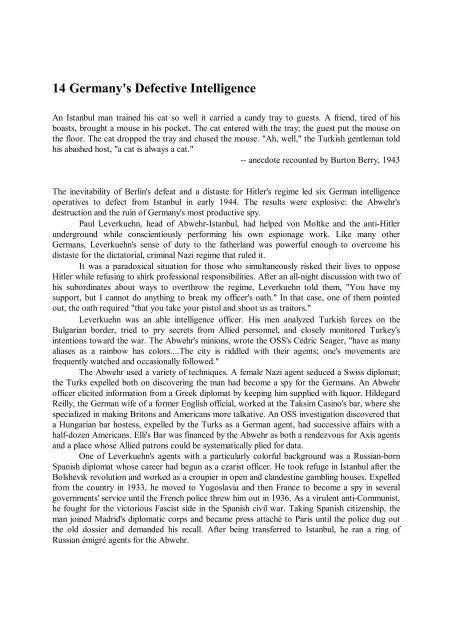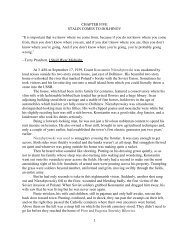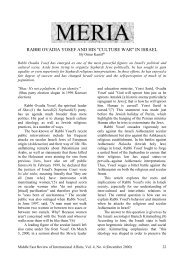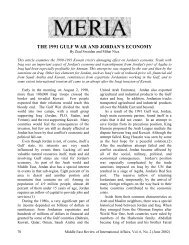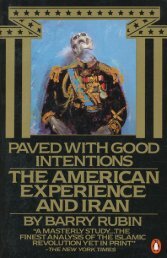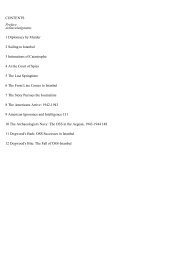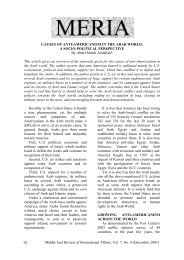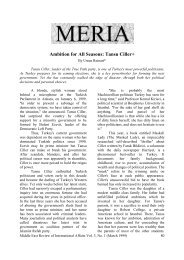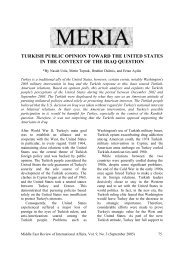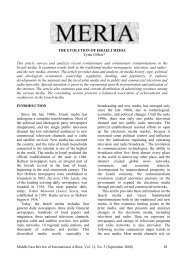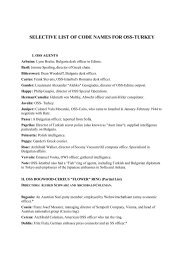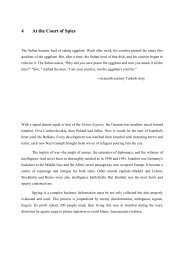14 Germany's Defective Intelligence - GLORIA Center
14 Germany's Defective Intelligence - GLORIA Center
14 Germany's Defective Intelligence - GLORIA Center
You also want an ePaper? Increase the reach of your titles
YUMPU automatically turns print PDFs into web optimized ePapers that Google loves.
<strong>14</strong> <strong>Germany's</strong> <strong>Defective</strong> <strong>Intelligence</strong><br />
An Istanbul man trained his cat so well it carried a candy tray to guests. A friend, tired of his<br />
boasts, brought a mouse in his pocket. The cat entered with the tray; the guest put the mouse on<br />
the floor. The cat dropped the tray and chased the mouse. "Ah, well," the Turkish gentleman told<br />
his abashed host, "a cat is always a cat."<br />
-- anecdote recounted by Burton Berry, 1943<br />
The inevitability of Berlin's defeat and a distaste for Hitler's regime led six German intelligence<br />
operatives to defect from Istanbul in early 1944. The results were explosive: the Abwehr's<br />
destruction and the ruin of <strong>Germany's</strong> most productive spy.<br />
Paul Leverkuehn, head of Abwehr-Istanbul, had helped von Moltke and the anti-Hitler<br />
underground while conscientiously performing his own espionage work. Like many other<br />
Germans, Leverkuehn's sense of duty to the fatherland was powerful enough to overcome his<br />
distaste for the dictatorial, criminal Nazi regime that ruled it.<br />
It was a paradoxical situation for those who simultaneously risked their lives to oppose<br />
Hitler while refusing to shirk professional responsibilities. After an all-night discussion with two of<br />
his subordinates about ways to overthrow the regime, Leverkuehn told them, "You have my<br />
support, but I cannot do anything to break my officer's oath." In that case, one of them pointed<br />
out, the oath required "that you take your pistol and shoot us as traitors."<br />
Leverkuehn was an able intelligence officer. His men analyzed Turkish forces on the<br />
Bulgarian border, tried to pry secrets from Allied personnel, and closely monitored Turkey's<br />
intentions toward the war. The Abwehr's minions, wrote the OSS's Cedric Seager, "have as many<br />
aliases as a rainbow has colors....The city is riddled with their agents; one's movements are<br />
frequently watched and occasionally followed."<br />
The Abwehr used a variety of techniques. A female Nazi agent seduced a Swiss diplomat;<br />
the Turks expelled both on discovering the man had become a spy for the Germans. An Abwehr<br />
officer elicited information from a Greek diplomat by keeping him supplied with liquor. Hildegard<br />
Reilly, the German wife of a former English official, worked at the Taksim Casino's bar, where she<br />
specialized in making Britons and Americans more talkative. An OSS investigation discovered that<br />
a Hungarian bar hostess, expelled by the Turks as a German agent, had successive affairs with a<br />
half-dozen Americans. Elli's Bar was financed by the Abwehr as both a rendezvous for Axis agents<br />
and a place whose Allied patrons could be systematically plied for data.<br />
One of Leverkuehn's agents with a particularly colorful background was a Russian-born<br />
Spanish diplomat whose career had begun as a czarist officer. He took refuge in Istanbul after the<br />
Bolshevik revolution and worked as a croupier in open and clandestine gambling houses. Expelled<br />
from the country in 1933, he moved to Yugoslavia and then France to become a spy in several<br />
governments' service until the French police threw him out in 1936. As a virulent anti-Communist,<br />
he fought for the victorious Fascist side in the Spanish civil war. Taking Spanish citizenship, the<br />
man joined Madrid's diplomatic corps and became press attaché to Paris until the police dug out<br />
the old dossier and demanded his recall. After being transferred to Istanbul, he ran a ring of<br />
Russian émigré agents for the Abwehr.
Leverkuehn's Abwehr also tried to foment subversion in the Middle East, despite its earlier<br />
failures there, and in the Soviet Union. One of its most ambitious plans was to build an<br />
underground revolutionary and espionage group in Iraq called the National Liberation Column.<br />
The movement began with remnants from the pro-German revolt, which the British had put down<br />
in 1941. Its leader was a Baghdad doctor whose henchmen--including high-ranking government<br />
officials--met in a pharmacy next to the physician's office to exchange information as they waited<br />
for "prescriptions.” A full-time liaison man was sent to Istanbul to make contact with the Germans<br />
and obtain aid from the Abwehr.<br />
British intelligence quickly realized that the Germans were up to something in Iraq and put<br />
the Arab group under surveillance for over eight months to uncover its plans. In fact, the Iraqis<br />
were so amateurish--losing one German-supplied wireless radio and being unable to operate its<br />
replacement--that the British wondered if the whole affair was a diversion. They were forced to<br />
take the plot more seriously, however, after capturing three German agents parachuted into Iraq in<br />
July 1943. Leverkuehn planned to send reinforcements to start a revolt among the Kurdish tribes.<br />
The British were determined to infiltrate the Abwehr's network through an Iraqi<br />
undercover agent, code-named "Zulu," who arrived in Istanbul on August 3. He went to a cafe on<br />
Istiklal Boulevard, gave a secret password, and was taken to the house of the movement's Istanbul<br />
representative. Zulu was shocked to realize that he had once met this man in Baghdad in the<br />
course of his police work. Fortunately, the revolutionary did not recognize him. When Zulu again<br />
gave the secret password, the blasé agent replied, "Such formalities are unnecessary."<br />
Thus cleared, Zulu was accepted by the Abwehr too. Posing as a delegate from the<br />
Baghdad underground, Zulu requested supplies from the Abwehr. The Germans demanded<br />
intelligence in exchange and brought models of British military vehicles to teach him how to<br />
interpret their unit markings.<br />
On the night of September 3, a Mercedes car picked up Zulu for a talk with Leverkuehn<br />
himself. The two men drove to an isolated spot and sat in darkness. The future of the Arab cause,<br />
Leverkuehn told him, depended on German victory, which, in turn, required intelligence about<br />
British oil refineries and forces in Iraq. Unaware that his three agents had been captured,<br />
Leverkuehn asked about them. Zulu replied they were doing well. Leverkuehn gave him $2000 for<br />
expenses and an English book with a radio code skillfully sewn into its back cover.<br />
At this moment, British intelligence heard that the Iraqi movement's treasurer was coming<br />
to Istanbul. Worried that he might uncover Zulu's true identity, the British arrested the entire pro-<br />
German ring in Baghdad. The Abwehr, not realizing that the British had outwitted it, thought the<br />
arrests were routine.” After all,” one German told Zulu, "this is a dangerous game."<br />
During 1942 and 1943, the Abwehr shifted its attention from the Middle East to the Soviet<br />
front. It recruited dozens of Soviet Moslem émigrés in Istanbul--some of whom reported<br />
everything to the NKVD--and contacted purported antigovernment groups in Soviet Georgia,<br />
Azerbaijan, and Uzbekistan. The Armenian nationalist Dashnak party worked closely with the<br />
Germans (though Soviet intelligence also penetrated Armenian communities throughout the<br />
Middle East). Leverkuehn subsidized these movements and tried to smuggle their operatives from<br />
Turkey into their home areas in the U.S.S.R.<br />
Since the Turks feared the U.S.S.R. and its intentions more than any other country,<br />
Turkey's foreign minister and the Emniyet regularly exchanged data with the Germans about the<br />
Soviet Union. The Turks permitted a small Abwehr radio and supply base near the Turkish-Soviet<br />
frontier, but they drew the line at allowing direct sabotage from their territory. German
intelligence officers who tried to sneak into the U.S.S.R. were detained, and the Emniyet arrested<br />
two Azerbaijanis caught smuggling machine guns, radio sets, and explosives across the border.<br />
Ankara also feared that rightist Turkish nationalist groups, which the Germans aided,<br />
might make trouble at home or try to stir up Turks across the border in the U.S.S.R. When it<br />
became clear that Germany was losing the war, the Emniyet banned such clubs and arrested their<br />
leaders. There was, however, little support for these organizations. "Had German fortunes in<br />
Russia not deteriorated so rapidly," an exaggerated British intelligence report claimed in<br />
December 1943, pro-German Turkish groups in the southern U.S.S.R. "might have proved a most<br />
efficacious and possibly decisive aid to the German forces in their planned advance...to Persia and<br />
the Middle East." Unfortunately for the Crimean Tatars and thousands of other Soviet Turks,<br />
Stalin deported them as a precaution and most were never allowed to return home.<br />
But German fortunes were now clearly in retreat, and the Turks were increasingly<br />
cooperating with the Americans and British. This development made it harder for the Abwehr to<br />
operate in Istanbul. The liaison man between the OSS and the Emniyet was Cedric Seager, an<br />
American who had grown up in Istanbul. The Turks kept him informed of the Abwehr's every<br />
move. He knew, for example, that four German agents equipped with radios and sabotage material<br />
were living at a house belonging to Paula Koch, one of Leverkuehn's most energetic agents. Since<br />
the Emniyet was watching them closely, however, it was better to follow them and discover their<br />
contacts than to take them into custody. "Paula Koch is more valuable to us free than under<br />
arrest," Seager concluded.<br />
Two members of Leverkuehn's Istanbul-based sabotage group, a Persian and a Turk,<br />
offered to sell Seager even more information, one of them demanding a $700 down payment. "He<br />
thinks," quipped Seager, "he is a dollar-a-word man." Instead of paying him, the American told the<br />
man that the Emniyet would no longer tolerate German agents. He could either talk or be "entirely<br />
at their mercy.” The Turks cooperated by seizing his passport for "routine inspection.” As a result,<br />
reported Seager, "the names of the Azerbaijanis, Persians and Caucasians who work for [German<br />
intelligence] are now known to me, and therefore to the British. Where they congregate of an<br />
evening, where they work and what they look like.”<br />
While it was increasingly difficult for German intelligence to operate in Istanbul, German<br />
defeats were making it even more vital to do so. The new top-priority issues were the timing and<br />
location of the next Allied offensives and Turkey's intention as to entering the war.<br />
Meanwhile, some Germans were battling with their consciences over whether to continue<br />
serving Hitler, while others were merely eager to join the winning side. Eric Vermehren and his<br />
wife, Countess Elisabeth Plettenberg, were in the former camp; some defectors were of a more<br />
opportunistic type.<br />
Eric Vermehren had won a Rhodes Scholarship in 1938 to attend Oxford University, but<br />
German officials suspicious of his political views held up his passport. By the time they relented,<br />
the war had begun. Unfit for regular military service because of an accidental gunshot wound as a<br />
child, Vermehren worked in German prisoner-of-war camps. Needing an aide he could trust,<br />
Leverkuehn recruited this 24-year-old son of an old friend and brought him to Turkey in<br />
Apri11943. Both Vermehren's mother and P1ettenberg's fervently Catholic parents had links with<br />
anti-Hitler groups. An exiled German resistance leader later questioned the sincerity of<br />
Vermehren's anti-Nazi feelings. Would anyone not entirely reliable, he asked, ever have been given<br />
an intelligence job? The answer was that Canaris and his lieutenants had welcomed many anti-
Nazis into their organization. From Hitler's standpoint the Abwehr had more unreliable people<br />
than any other German institution.<br />
When Vermehren went home to see his wife, she insisted that they break with the<br />
government and defect. This step, however, was made more difficult by a new Gestapo regulation<br />
prohibiting citizens from leaving the Reich. Diplomats' relatives were virtual hostages to<br />
discourage defections. Through influential friends, the countess arranged her own Foreign Office<br />
assignment in Istanbul. She divided her bank accounts among younger brothers and sisters and set<br />
off to join her husband in Turkey. Leverkuehn worried about such an open violation of the<br />
Gestapo's rule and had her stopped at the Bulgarian border. But the strong-willed countess again<br />
used her connections to obtain a seat on the courier flight to Istanbul. When she arrived on<br />
December 24, 1943, Leverkuehn ordered Vermehren to submit a report dissociating himself from<br />
his wife's trip.<br />
But matters were even more complex than Leverkuehn knew. A few days later, Vermehren<br />
contacted Nicholas Elliott of British intelligence. Vermehren went to dinner at Elliott's apartment<br />
at 7 p.m. and the men talked through the night. He did not want to see his beloved fatherland<br />
ruined by the Nazis, Vermehren explained, but he also feared appearing to be a traitor to Germany<br />
or a dishonorable rascal in his friends' eyes. Therefore, he did not want to defect openly or join the<br />
British war effort. Elliott agreed to these conditions.<br />
To prepare for escape, the Vermehrens moved to a new apartment and told Leverkuehn<br />
they did not yet have a telephone. On January 27, 1944, the couple attended a neutral embassy's<br />
cocktail party. As they left, two men pushed them into a passing car to persuade any witnesses<br />
that the Vermehrens had been kidnapped. When Vermehren did not show up for work the next<br />
morning, Leverkuehn sent a search party which became lost trying to follow Vermehren's<br />
deliberately inaccurate directions to his new home.<br />
When the Germans realized what was happening, von Papen sped back from a skiing<br />
vacation, but the Vermehrens were already en route to Cairo. They were intensively debriefed for<br />
a month. Vermehren made a radio broadcast attacking Hitler. As a new, junior officer, he knew<br />
few major secrets, but he did tell about German-Turkish intelligence exchanges regarding the<br />
U.S.S.R. The British passed this information to Moscow, and a Soviet protest led Turkey to stop<br />
this practice. When the Vermehrens went to London, a British counterintelligence officer named<br />
Kim Philby loaned them his mother's apartment. Perhaps the Soviets' gratitude explains Philby's<br />
hospitality to the couple. Philby was, after all, the NKVD's top mole in British intelligence.<br />
The defections had an explosive effect in Berlin, where the Abwehr's old rivals--Heinrich<br />
Himmler's Security Ministry and von Ribbentrop's Foreign Ministry--pounced on a chance to<br />
discredit Admiral Canaris and his intelligence organization. Canaris's enemies, ignorant of British<br />
success in this area, claimed Vermehren might reveal the workings of German codes. Von Papen<br />
insisted Vermehren had no such information. The OSS had so many good sources in the Abwehr<br />
that it followed the process closely. On February 24, 1944, Dulles cabled Washington: "659's<br />
[Canaris's] position and his whole outfit has been seriously jeopardized by the...V[ermehren] affair<br />
in Turkey. Abwehr will probably be taken over by Himmler....It is unlikely that 659 [Canaris] will<br />
offer a strong protest since he is somewhat of a Buddha....It may be wise to encourage certain<br />
Abwehr men in important jobs to decline to go back to Germany, if as appears probable, they will<br />
lose all value for our purpose.”<br />
Himmler's men were determined to destroy the hated competitor who had dominated<br />
foreign intelligence gathering. Ernst Kaltenbrunner, Himmler's intelligence chief, wrote Hitler on
February 7 that the Abwehr's Istanbul operation was a traitors' nest. Vermehren's flight "has<br />
gravely prejudiced the activities not only of Abwehr-Istanbul but of our other military agencies in<br />
Turkey. The entire work of the Abwehr station has been exposed and its continuation seems<br />
impracticable."<br />
Five days later, Hitler abolished the Abwehr, ordering: "A unified German espionage<br />
service is to be created. I entrust the Reichsfiihrer SS [Himmler] with the command." Canaris was<br />
fired and placed under surveillance; Leverkuehn was sent home. In addition to demanding<br />
Leverkuehn's firing, Kaltenbrunner had named as enemy spies a number of Abwehr agents,<br />
including Willi Hamburger and Karl Kleczkowski, a 43-year-old journalist who, with his wife's<br />
help, gathered political gossip and spread German propaganda around Istanbul.<br />
The twenty-five-year-old Hamburger was the best-known Abwehr officer in Istanbul. His<br />
grandfather was founder of Austria's paper industry; his father was a prominent Viennese<br />
industrialist and Nazi party member. Hamburger had grown up amid great wealth; on coming of<br />
age, each child in the family had received a paper mill. Hamburger had attended the same school as<br />
Kurt Waldheim, and he was active in a fascist student group to which the future UN secretarygeneral<br />
belonged. After earning a doctorate in Middle East studies, he was recruited into the<br />
Abwehr and sent to Istanbul under cover as a buyer of hemp and flax--items about which he knew<br />
nothing. Most nights he could be seen with his entourage at the Park Hotel or an Istanbul<br />
nightclub. This group's philosophy was that if one could not have a good time with the espionage<br />
business and the lavish expense accounts, it was not worth being a spy at all. One of Hamburger's<br />
colleagues, a German officer who had won an equestrian medal at the 1936 Olympics,<br />
unharnessed a carriage horse and led it into the Park's dining room. When a local informant<br />
proposed that Hamburger meet him in a graveyard at midnight, the Abwehr officer replied, "Are<br />
you crazy? Let's have dinner on the Park Hotel's terrace."<br />
Hamburger's main work for the Abwehr was to smuggle goods through the Allied<br />
blockade on Germany and to gather intelligence on Middle East political and military<br />
developments. It was like assembling a giant jigsaw puzzle in which the smallest piece might prove<br />
the most critical. He found American and Middle East magazines good sources of information.<br />
Reports of military sporting events, officers' marriage announcements, and other items helped the<br />
Abwehr locate Allied units.<br />
But Hamburger was also an Austrian patriot and a stubborn individualist. The confident<br />
young man talked freely with Leverkuehn about his discontent. Hamburger and the Austrian-born<br />
Kleczkowski had contacted the Americans to offer cooperation even before Vermehren decided to<br />
defect. When Kleczkowski told Italian friends that he hoped Austria would soon regain its<br />
independence from Germany, they thought him an agent provocateur. Through a Turkish contact,<br />
however, Kleczkowski met the flamboyant George Earle in October 1943 and began giving him<br />
fairly unreliable information, including a purported plan for a German-Bulgarian attack on Istanbul<br />
should Turkey enter the war.<br />
Hamburger's encounter with Earle was more dramatic. Earle's great love in Bulgaria had<br />
been a Hungarian singer named Adrian Molnar. She was a breathtakingly beautiful woman who<br />
resembled the young Ingrid Bergman. After Earle left Bulgaria, she returned to Hungary, having<br />
refused to go with him to Turkey. Earle insisted that he was going to bring Molnar to Istanbul<br />
even if he had to go into Axis Budapest himself to fetch her, and his behavior was erratic enough<br />
to convince some people he might be serious. Earle once tried to hire the Dogwood courier<br />
Gyorgy to bring him a prize bulldog from Hungary.
To accommodate Earle or to spy on him, Leverkuehn and Hamburger arranged for Molnar<br />
to come to Istanbul. She was hired to sing at the Taksim Casino, but she had a falling out with<br />
Earle just before her debut. Hamburger was in the audience that night, and he asked the manager<br />
why Molnar did not begin her performance. She was crying in her dressing room, the man told<br />
Hamburger. The Abwehr officer went backstage to see what was wrong. She was upset after<br />
having an argument with Earle. Hamburger and Molnar met for the first time and quickly fell in<br />
love.<br />
Earle soon heard about this romance and decided to meet Hamburger to take the measure<br />
of his rival. Either through fickleness or through willingness to acknowledge defeat, Earle told<br />
Hamburger that he was giving Molnar up. The two men began to talk about politics. When<br />
Hamburger maintained that he was loyal to the Austrian resistance, Earle made him kneel down to<br />
swear allegiance to a free Austria. The Abwehr officer was willing to propitiate the eccentric<br />
American who, after all, seemed to offer a direct line to President Roosevelt. But Earle proved a<br />
poor conduit: he had little credibility in the White House and garbled all the information he was<br />
given.<br />
Earle also had a poor sense of security. One of his minions, a well- known American agent,<br />
once brought Hamburger a message at his little bungalow next door to von Papen's summer<br />
house. Hamburger saw the motor launch sailing up the Bosporus with the American carrying a<br />
briefcase and standing conspicuously in the back. The boat tied up at a pier in front of his house,<br />
and the man marched blithely up to his, front door. It is not surprising that pro-Berlin Germans<br />
became suspicious. From its office near the furnace in the consulate basement, the SD watched the<br />
Abwehr's activities and plotted revenge.<br />
When Hamburger, Kleczkowski, and the other Abwehr men accused of working with the<br />
Allies were ordered back to Berlin, the Kleczkowskis resolved to bolt. Hamburger thought he<br />
could talk his way out of any charges by using his family's connections with several German<br />
generals. Unbeknownst to him, however, the Kleczkowskis had gone into hiding in Istanbul and<br />
the Abwehr panicked, ordering the arrest of the other suspects. Hamburger was awakened at<br />
dawn on February 12 by two Abwehr men pounding on his door. "You are under arrest," they<br />
proclaimed, "and will be put on the next train to Germany.”<br />
Hamburger promised to cooperate but asked to telephone his chief Turkish agent lest his<br />
disappearance provoke controversy. The security men let Hamburger do so. "I am going to Berlin<br />
for a week and will be back," he explained. "Tell our friends to 'Tell it to the Marines.'“ The last<br />
phrase was the contemporary American slang for calling something nonsense. Understanding this<br />
simple code, the Turk sought help from the British.<br />
Meanwhile, Hamburger stalled by selling the security men his radio and packing his bags<br />
slowly. Then the telephone rang. It was his Turkish agent. "Everything will be all right," he told<br />
Hamburger. "A car is waiting in front of your door." Hamburger casually put down the phone,<br />
raced outside, and jumped into the auto before the guards could stop him. The driver took him to<br />
the British consulate, where he was given breakfast and a new identity. On the way to the airport,<br />
an Abwehr officer passed within a few feet of Hamburger without noticing him. The OSS and the<br />
British successfully evacuated all three Austrians to Cairo. Despite von Papen's demands, the<br />
Turks did nothing to find them.<br />
The Americans and British exulted. "Cairo bade fair to be swamped by an invasion of<br />
evaders and turncoats," cheered an OSS report. Hamburger did radio broadcasts and<br />
psychological warfare work in Cairo for the Americans and British. His papers identified him as an
American lieutenant from Seattle. Hamburger's confessions blew the cover of twenty German<br />
agents in the Middle East who had been working for him. But interrogators found the<br />
Kleczkowskis less helpful. The couple was taken to New York under armed guard and<br />
incarcerated as "dangerous enemy aliens." They were deported in 1947 to Colombia, where they<br />
prospered in business.<br />
Istanbul's German community was in a panic. No one knew who might next make a break;<br />
everyone was frightened of being arrested and sent back to Germany to face a firing squad.<br />
Suspicious officials paid unannounced "visits" to each other, almost surprised to still find<br />
colleagues at their desks. Von Papen sent his deputy to Berlin for a Gestapo hearing on these<br />
events. The meeting was interrupted by an air-raid alert and never reconvened. On a street in the<br />
capital, the aide picked up leaflets dropped by the Allied planes announcing the defections and<br />
claiming the German embassy in Turkey was in chaos.<br />
Hans Fritzsche, deputy propaganda minister and a talented orator, soon arrived to shore up<br />
German morale in Istanbul. "Due to the fact that you are always exposed to the full impact of<br />
virulent propaganda, you are deserving of sympathy," he told an audience of 200 at the Teutonia<br />
Club. "You are also deserving of congratulations," he added sarcastically, "for your escape from<br />
the hardships of wartime and from bombings.”<br />
He reassured them that Germany would still win the war. "There is no need to worry about<br />
the Eastern front," he claimed. "Instead remember that the armies of Germany are still far from<br />
Germany and on foreign soil." Germany was working on secret weapons, but it did not yet have<br />
something which would "sweep Britain off the face of the earth in five minutes, after which twenty<br />
minutes will be all that is needed to blast America to hell." Nevertheless, <strong>Germany's</strong> triumph and<br />
revenge were inevitable. "We must await the day when victory is ours. It will come with a<br />
vengeance when that day arrives."<br />
If the Germans were receiving any indication about what the future really held, however,<br />
that news was coming from a most peculiar source, the German agent code-named "Cicero." His<br />
occupation: valet of the British ambassador to Turkey.


